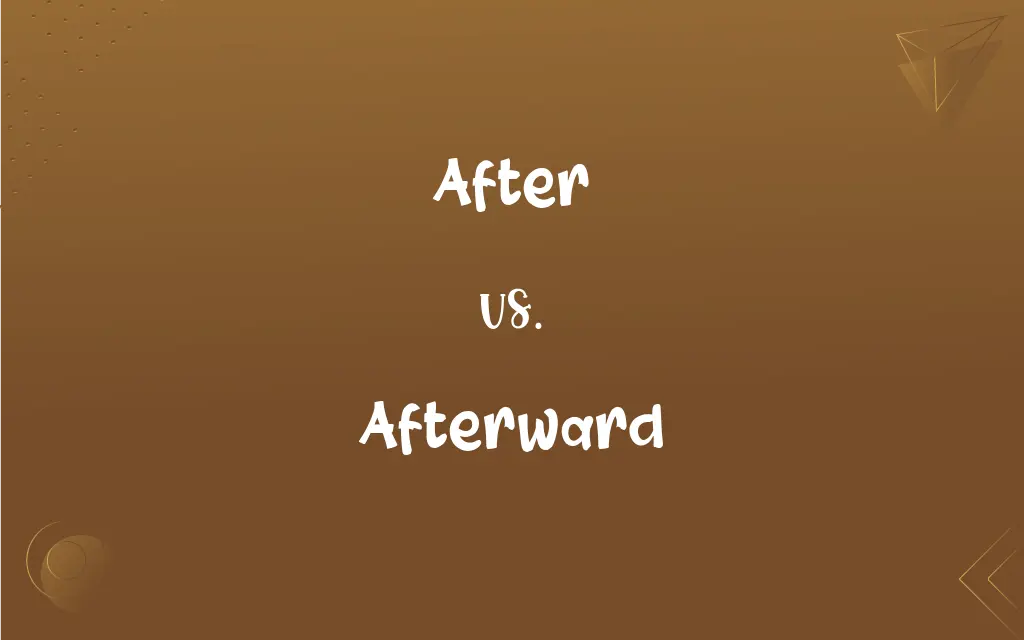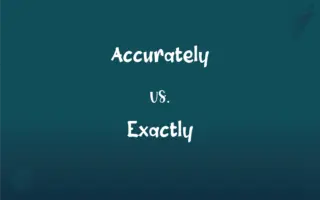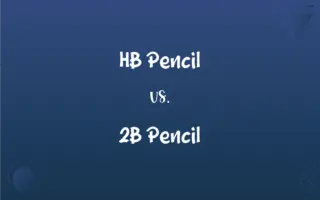After vs. Afterward: What's the Difference?
Edited by Harlon Moss || By Aimie Carlson || Published on January 24, 2024
"After" is a preposition or conjunction indicating subsequent time or event, while "afterward" is an adverb meaning at a later time.

Key Differences
"After" is used to denote a sequence in time or order, often introducing a clause. "Afterward" is used to refer to a time following a specific event, typically at the end of a sentence.
In usage, "after" connects two events to show a relationship of time or sequence. "Afterward" acts as a standalone adverb, indicating what happens next without needing a direct object.
"After" can be used to indicate a following in place, time, or order. "Afterward" is strictly temporal and does not imply spatial sequence.
When expressing a cause-and-effect relationship, "after" is the preferred choice. "Afterward" is used when the focus is on the timing of events rather than causality.
"After" can also imply a pursuit or search, as in "after you." "Afterward" has no such usage and is limited to indicating subsequent time.
ADVERTISEMENT
Comparison Chart
Part of Speech
Preposition or conjunction
Adverb
Usage in a Sentence
Connects two clauses or events
Stands alone at the end
Temporal vs. Spatial
Indicates time and order
Indicates only time
Cause-and-Effect
Yes
No
Implication of Pursuit
Can imply pursuit
No implication of pursuit
ADVERTISEMENT
After and Afterward Definitions
After
As a preposition, "after" indicates what follows in time.
After the movie, we went to dinner.
Afterward
It can indicate a subsequent action.
He spoke to them, and shortly afterward, they left.
After
"After" can denote a sequence in events.
After completing her homework, she watched TV.
Afterward
"Afterward" is used to refer to the later part of a period.
In the evening, we watched a movie, and afterward, we discussed it.
After
Used as a conjunction, "after" connects two ideas.
After she left, it started to rain.
Afterward
It can denote a concluding event.
After the ceremony, we gathered for photos and left shortly afterward.
After
"After" can mean in pursuit of.
The police were after the suspect.
Afterward
"Afterward" means at a later time.
We went for a walk and had coffee afterward.
After
"After" can also indicate in the style of.
She named her daughter after her grandmother.
Afterward
"Afterward" often wraps up a narrative.
She told her story, pausing for effect, and smiled sadly afterward.
After
Behind in place or order
Z comes after Y in the alphabet.
Afterward
At a later time; subsequently.
After
Next to or lower than in order or importance.
Afterward
(US) afterwards
Afterward
Happening at a time subsequent to a reference time;
He apologized subsequently
He's going to the store but he'll be back here later
It didn't happen until afterward
Two hours after that
FAQs
What is "after" primarily used for?
"After" is used as a preposition or conjunction to indicate sequence or time.
Is "afterward" interchangeable with "after"?
No, because "afterward" is an adverb and "after" is a preposition or conjunction.
Can "after" be used in place of "afterward"?
Not usually, as they serve different grammatical functions.
Can "after" indicate spatial sequence?
Yes, "after" can imply spatial order as well as temporal.
What is "afterward" primarily used for?
"Afterward" is an adverb indicating something happening at a later time.
Does "afterward" imply spatial sequence?
No, "afterward" strictly refers to time.
How does "after" function in a sentence?
"After" connects clauses or events to show sequence.
Can "afterward" start a sentence?
Rarely, as it's typically used at the end or in the middle of a sentence.
Can "after" imply a cause-and-effect relationship?
Yes, "after" is often used to show causality.
Does "afterward" imply cause-and-effect?
No, "afterward" focuses on the sequence of time.
How does "afterward" function in a sentence?
"Afterward" acts as an adverb, often concluding a sentence.
Can "after" be used in legal contexts?
Yes, "after" is often used in legal language.
Is "after" used in idiomatic expressions?
Yes, like "after you" or "day after day."
Is "afterward" used in idiomatic expressions?
No, "afterward" is generally used in its literal sense.
Is "after" used in formal writing?
Yes, "after" is appropriate in both formal and informal contexts.
Is "afterward" used in formal writing?
"Afterward" is suitable for formal and informal writing.
Can "after" start a sentence?
Yes, "after" can start a sentence when used as a conjunction.
Are there variations of "afterward"?
Yes, "afterwards" is a common variant.
Are there variations of "after"?
No, "after" is consistent in its form.
Is "afterward" common in legal language?
Less so, as legal language often requires more precise temporal markers.
About Author
Written by
Aimie CarlsonAimie Carlson, holding a master's degree in English literature, is a fervent English language enthusiast. She lends her writing talents to Difference Wiki, a prominent website that specializes in comparisons, offering readers insightful analyses that both captivate and inform.
Edited by
Harlon MossHarlon is a seasoned quality moderator and accomplished content writer for Difference Wiki. An alumnus of the prestigious University of California, he earned his degree in Computer Science. Leveraging his academic background, Harlon brings a meticulous and informed perspective to his work, ensuring content accuracy and excellence.































































